(Ctrl-End to reach bottom of page)
THE FIRST
3 January 2010
Dear Souls -
First I must explain who I am and where I've been hiding. My name is Prudence, and I'm here to guide souls toward wiser living. Throughout the ages I've remained mostly hidden in the wings, but at various times over the centuries I step out into the open world. This time I thought a non-blog would be the best format, since I prefer to stay out of sight. You can guess why I've decided to try and help here in the present. And if you can't, well you must be living under a large, heavy boulder.
My idea is to share wisdom accumulated over the ages by directly citing the sources themselves. Perhaps their words will strike a contrast to the blibber-blabber of current events. Perhaps not. You choose.
I will begin simply, with an old favorite of mine, and grow throughout the year.
"What has been will be again,
What has been done will be done again;
there is nothing new under the sun."
Ecclesiastes 1:9
But, here lies a path towards wisdom.
Yours, Prudence
|
THE SECOND
4 January 2010
Dear Souls -
With the New Year just beginning, here is a thought on time.
"So take good care of time, therefore, and how you spend it. Nothing is more precious than time. In one small particle of time, little as it is, heaven can be won and lost. This is a sign that time is precious: God, who is the giver of time, never gives two particles of time together, but one after the other. This is because He refuses to reverse the order and the regular chain of causes in His creation. Time is made for man, not man for time."
The Cloud of Unknowing, Anonymous Monk, late fourteenth century
But, here lies a path towards wisdom.
Yours, Prudence
|
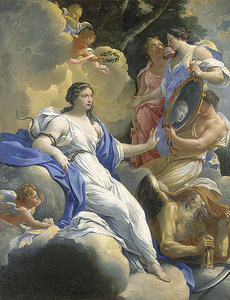 |
| Simon Vouet, Allegory of Prudence, c. 1645 |
|
|
THE THIRD
5 January 2010
Dear Souls -
My suitcases are now unpacked and I feel settled here. Putting away belongings makes me ponder why and how we gather so much clutter as we move through life. This year I received fewer gifts for Christmas, since I was on the move, but still there are the decorations to store away and a few gifts in a pile to be put in their proper places. But how is it we need all this stuff?
"Therefore let none of us have even the wish to possess. For what profit is it to possess these things which yet we cannot take with us? Why not rather possess those things which we can take away with us - prudence, justice, temperance, fortitude, understanding, charity, love of the poor, gentleness, hospitality? For if we gain these possessions, we shall find them going beforehand, to make a welcome for us there in the land of the meek."
Saint Antony of the Desert - St. Athanasius 351-362
And I wonder why, if St. Athanasius wrote this in the fourth century, we are still gathering our goods here in the twenty-first century - more so than ever before? Possessions for our closet are just simpler to gather than possessions for our hearts. That, I believe, is the answer. But, here lies a path towards wisdom.
Yours, Prudence
P.S. "To the happy and prosperous man prayer is but a meaningless jumble of words until grief comes to explain to the unfortunate wretch the sublime language which is our means of communication with God."
The Count of Monte Cristo - Alexandre Dumas, 1844
|
THE FOURTH
6 January 2010
Dear Souls -
"It is one thing to speak humbly, another to think humbly, and humility is one thing while the blossom of humility is another, and yet another the latter's fruit and the beauty of that fruit, and still another the energies which come out from the last."
The Ethical Discourses -St. Symeon the New Theologian (949-1022)
Humble? Not a popular twenty-first century word. The dictionary defines Humble by what it's not.
Humble- not proud or haughty; not arrogant or assertive.
Humble sounds like this: "I'm sorry," even when you know you're right.
Humble looks like this:
|
But, here lies a path towards wisdom.
Yours, Prudence
|
THE FIFTH
7 January 2010
Dear Souls -
As I considered Humble vs Haughty, I doubted my undertanding of Haughty.
"If it seems to you that you know many things and thoroughly understand them all, realize that there are countless other things of which you are ignorant. Be not haughty, but admit your ignorance."
The Imitation of Christ -Thomas a Kempis, 1420
Simply put, focus on what you're not.
This morning I made what I call Old Banana Bread. Bread made from old banana's that were on their way to the trash bin. At the last moment, they were rescued, and restored into a new form. Fresh baked banana bread. Simply put, focus on what you're not.
There may be more where there's less. But, here lies a path towards wisdom.
Yours, Prudence
P.S. Humble pie is a pie made from the edible organs of a deer - eat humble pie, but only if you're starving.
|
THE SIXTH
8 January 2010
Dear Souls -
"Let the humble be told that when they lower themselves, they ascend to a likeness of God, let the haughty be told that when they promote themselves they fall into imitation of an angel who forsakes his faith. What then is more debased than haughtiness, which, while it stretches itself above itself, is lengthened out beyond the stature of true loftiness?"
The Book of Pastoral Rule - St. Gregory the Great, 590
My mother often said,"Eat humble pie." I'm sure she didn't mean deer pie. How then are we, living in a self-promoting society, to live humbly. Life in the sixth century was by its nature a humble existence, at least by our standards.
I imagine a humble twenty-first century existence this way:
|
But, here lies a path towards wisdom.
Yours, Prudence
|
THE SEVENTH
9 January 2010
Dear Souls -
"If we would please God, we must have love, we must be of one mind, we must follow humility, each one thinking the other higher than himself. This is true humility, when one never claims anything proudly for himself, but thinks oneself to be the inferior."
Three Books on the Duties of the Clergy - St. Ambrose, 391
|
.
I'm sorry for the stark images. How else can we reach beyond ourselves and think of humility? If we take the opportunity each day to live with greater humility, then perhaps the idea will catch on with others, too. It couldn't hurt to dress in humble for a few days, and see how it fits.
But, here lies a path towards wisdom.
Yours, Prudence
|
THE EIGHTH
10 January 2010
Dear Souls -
Wearing the garment of humility may feel awkward at first. You may even feel out of style amongst the crowd wearing the garment of pride. But someone has to start a new trend - whoever thought flip-flops would be considered stylish footwear? The Romans wore flip-flops because that's all they had. We on the other hand can wear all kinds of shoes, so why choose simple flat flip-flops when you can wear quality leather boots? Dressing like the rest of the world is easy, but doing something different will stand out.
"Pride is said to be "the beginning of all sin," not as though every sin originated from pride, but because any kind of sin is naturally liable to arise from pride."
Summa Theologica - St. Thomas Aquinas 1265-1274
Staying away from pride will keep us out of other trouble as well - another good reason for wearing humility for a few more days. Maybe humility, like stiff new jeans (non-prewashed denim) will soften and become form-fitting over time.
|
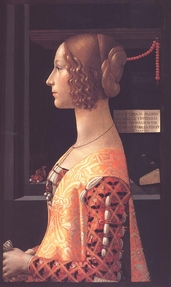 |
| "Conduct and Soul" Domenico Ghirlandaio, 1488 |
|
|
But, here lies a path towards wisdom.
Yours, Prudence
|
THE NINTH
14 January 2010
Dear Souls -
"There are some souls, and some minds, as unruly as horses not yet broken in. No one can stop them: now they go this way, now that way; they are never still. Although a skilled rider mounted on such a horse may not always be in danger, he will be so sometimes; and, even if he is not concerned about his life, there will always be the risk of his stumbling, so that he has to ride with great care."
The Way of Perfection - St. Teresa of Avila, 1567
|
 |
| Saint Teresa of Avila |
|
|
The modern mind is an unruly multi-tasking mind, scampering like an unbroken horse. Where is the horse grazing in a peaceful meadow?
But, here lies a path towards wisdom.
Yours, Prudence
|
THE TENTH
15 January 2010
Dear Souls -
Perhaps I should share with you about my travels the past few days. I spent time at a local monastery with a group of Orthodox nuns. They were very kind and shared their space, food, and Services with me, an outsider. Their life is a different life than most of us lead, but by their example we can better see our flaws and struggles here in the open world. I am grateful for their willingness to have me as their guest, and for the opportunity to talk with them about many subjects (including this website). Seeking a wiser life comes from many different angles, and for me one angle included my visit to their monastery.
"Wisdom and prudence will be our advisers, looking out for our best interests; they will order our lives so we never suffer from any thoughtless folly."
Dogmatic Treatises - St. Gregory of Nyssa, 376
We must cultivate our own wisdom, or prudence, and this will not happen by watching TV, or reading the newspaper. This is an endeavor which today goes beyond the popular media and our contemporary culture. Wisdom, which most of us will not seek within the walls of a monastery, is something we must actively seek. Most of you, I believe, haven't the time to spend pouring over ancient texts looking for pearls of wisdom. My purpose is to function as a travel guide, taking us back through the ages to the thoughts of souls wiser than ourselves.
My own perspective is that of a cradle Orthodox Christian, but I believe wisdom extends beyond the Great Schism of 1054 which divided the East and West into different neighborhoods. True wisdom draws from way beyond a schism of any sort, and merges both Eastern and Western thought.
|
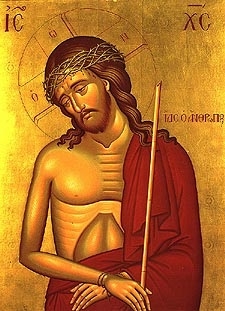 |
| Icon of Extreme Humility |
|
|
But, here lies a path towards wisdom.
Yours, Prudence
|
THE ELEVENTH
17 January 2010
Dear Souls -
"So then, human beings are by nature enamoured of (and love) the beautiful. Now what is truly beautiful and lovable is the good. But it is God who is good. Thus, if all things tend to the good, then all things tend to God."
Rules of St. Basil - St. Basil the Great, 330-379
And those words capture the simplicity and the beauty of it all.
|
But, here lies a path towards wisdom.
Yours, Prudence
|
THE TWELFTH
18 January 2010
Dear Souls -
I was thinking this morning of how easy it is to take something simple and make it difficult. We do it all the time without much thought at all. What if the simple path to wiser living was a recipe? As with most recipes we know the closer we follow the recipe, the better chance we have of creating what we intended.
A SIMPLE RECIPE FOR WISDOM
10 Commandments
Love your neighbor
Humility
Forgiveness
Blend together in a large open heart and simmer at body temperature for many, many years.
Avoid excessive garnishes. YIELD: One Wise Soul
|
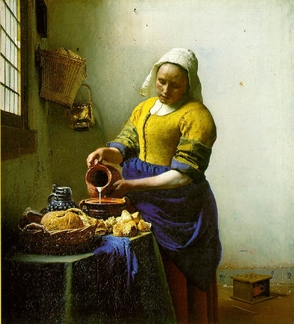 |
| The Milkmaid - Vermeer, 1657 |
|
|
But, here lies a path towards wisdom.
Yours, Prudence
|
THE THIRTEENTH
19 January 2010
Dear Souls -
"Human wisdom consists in piety. This you have in the book of the saintly Job, for there he writes that Wisdom herself said to man, "Behold, piety is wisdom." If, then, you ask what kind of piety she was speaking of, you will find it more distinctly designated by the Greek term theosebeia, literally, "the service of God."
The Greek has still another word for "piety," ensebeia, which also signifies "proper service." This too refers chiefly to the service of God. But no term is better than theosebeia, which clearly expresses the idea of the man's service of God as the source of human wisdom.
When you ask me to be brief, you do not expect me to speak of great issues in a few sentences, do you? Is not this rather what you desire: a brief summary or a short treatise on the proper mode of serving God?
If I should answer, "God should be worshipped in faith, hope, love," you would doubtless reply that this was shorter than you wished, and might then beg for a brief explication of what each of these three means: What should be believed, what should be hoped for, and what should be loved? If I should answer these questions, you would then have everything you asked for in your letter. If you have kept a copy of it, you can easily refer to it. If not, recall your questions as I discuss them."
Handbook on Faith, Hope and Love - St. Augustine, 420
|
 |
| Saint Augustine - Botticelli, 1480 |
|
|
But, here lies a path towards wisdom.
Yours, Prudence
|
THE FOURTEENTH
20 January 2010
Dear Souls -
January, the start of a new year and the start of a new decade, gives rise to new resolutions. With our personal resolutions we may try improving our health with better habits of everyday living (eat healthier, work out more, get more sleep). Maybe our resolutions seek intellectual self-improvement (read more books, watch less TV). We may even reach deeper into our heart for our resolutions (be kinder, more patient). But, we're trying to improve ourselves.
Is there anything missing from our new year's resolutions?
"The majority it is true, of those who are not very sensibly minded, propose to be content with escaping hell; but I say a far more severe punishment than hell is exclusion from the glory of the other world. I think one who has failed to reach it ought not to sorrow so much over the miseries of hell, as over his rejection from heaven."
An Exhortation to Theodore After His Fall - St. John Chrysostom, 347-407
|
 |
| THE CHURCH |
|
|
But, here lies a path towards wisdom.
Yours, Prudence
|
THE FIFTEENTH
20 January 2010
Dear Souls -
Where is the value of Mystery, and what lies behind Secrets?
“'But we speak God’s wisdom in a Mystery.' What Mystery? For surely Christ said,'What you have heard in the ear, proclaim from the housetops.' How then does he call it “a Mystery?”
Because neither angel nor archangel, nor any other created power knew of it before it actually took place.
Then He said, 'That now to the principalities and powers in heavenly places might be known by the Church, the manifold wisdom of God.' And this God has done in honor of us, so that they with us should hear the Mysteries. For we, too, ourselves, with whom we make our friends, use to speak of this as a sure proof of friendship towards them; we tell our secrets to no one in preference to them.
Let those hear, those who expose to shame the secrets of the Gospel, and to all who indiscriminately display the “pearls” and the doctrine, and who cast “the Holy things” to “dogs,” and “swine,” and useless reasonings.
For the Mystery wants no arguments; but just what it is, only is to be declared. Since it will not be a Mystery, divine and whole in all its parts, when you add any thing to it of yourself also."
Homilies on the Epistles of Paul to the Corinthians (VII) - St. John Chrysostom, 362
|
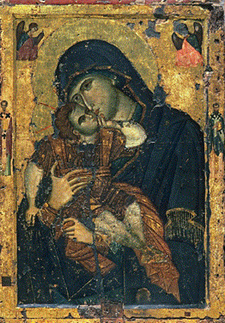 |
| MYSTERY |
|
|
I've nothing more to add.
But, here lies a path towards wisdom.
Yours, Prudence
|
THE SIXTEENTH
22 January 2010
Dear Souls -
We struggle with a life which is complicated in many different ways, sometimes using our mind when it's not needed.
"The beginning of life is faith, and the end is love. And these two being inseparably connected together, do perfect the man of God; while all other things which are requisite to a holy life follow after them.
No man making a profession of faith ought to sin, nor one possessed of love to hate his brother. For He that said, 'Thou shalt love the Lord thy God,' said also, 'and thy neighbour as thyself.' Those that profess themselves to be Christ’s are known not only by what they say, but by what they practise. 'For the tree is known by its fruit.'”
Epistle to the Ephesians - St. Ignatius of Antioch, (approx. 35 - 117)
Maybe our complicated lives need a dash of simple faith?
|
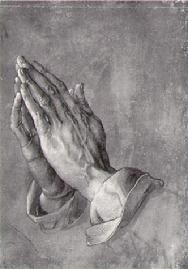 |
| Praying Hands - Albrecht Durer, 1508 |
|
|
But, here lies a path towards wisdom.
Yours, Prudence
|
THE SEVENTEENTH
23 January 2010
Dear Souls -
“Then why,” it is asked, “did the Deity descend to such humiliation? Our faith is staggered to think that God, that incomprehensible, inconceivable, and ineffable reality, transcending all glory of greatness, wraps Himself up in the base covering of humanity, so that His sublime operations as well are debased by a mix with the grovelling earth.”
The Great Catechism - St. Gregory of Nyssa, 376
|
But, here lies a path towards wisdom.
Yours, Prudence
|
THE SEVENTEENTH
24 January 2010
Dear Souls -
Sunday morning. A word popped into my mind - alms.
alms - a charitable donation of food or money to the poor.
"Now one day the brother came in and saw they were short of loaves. A poor man came, and the old man told the brother to give him alms. He said, 'It is no longer possible, father.' The old man said to him, 'Go in and look.' The brother went inside and found the bin full of loaves. When he saw that, he was filled with fear, and taking some he gave to the poor. In this way, he learned the faith and virtue of the old man, and he gave glory to God."
The Desert Fathers
|
But, here lies a path towards wisdom.
Yours, Prudence
|
THE EIGHTEENTH
26 January 2010
Dear Souls -
There is someone I want you to meet. Her name is Tata or Grandmother. She came to America from the old country, which for her was the Old City of Jerusalem where she was raised. Her family lived in Jerusalem for many generations, and no doubt a few of her ancestors remain there. When she left Jerusalem with her mother and sisters at the age of fourteen, it was for both her first and her last time. All she brought with her to the United States were some clothes packed in one suitcase, and her faith, which was rooted deep in her heart. She didn't own a Bible and she never read any theology, but her Orthodox Christian faith was carried in her heart.
Five years later, she married a man who was from the city of Bethlehem, and together they started a family in their new country. With their friends from the old country, they built an Orthodox Christian Church where they would raise their children in the Faith they knew, by heart. For the new Church they sent to the old country for a priest, because they knew of nowhere else to find an Orthodox priest. When their new priest arrived, he only knew Divine Liturgy in Arabic, but that was fine - they knew Divine Liturgy in Arabic, by heart.
Perhaps, they thought, someday we will have an American priest with Divine Liturgy in English. But for right now, we are grateful to be here in America with our family, and we are grateful to have an Orthodox Christian Church.
As the years passed, Tata raised her children the way she was raised in the old country. She taught them her Faith she knew, by heart. She didn't use theological texts and she didn't rely on Scripture, she used her heart. Because her Faith, was a Faith of the heart.
|
But, here lies a path towards wisdom.
Yours, Prudence
|
THE NINETEENTH
28 January 2010
Dear Souls -
Now you may wonder if it is possible to have a knowledge of Faith in your heart. Maybe, you say, this is only possible for a woman from the Holy Land, but for me I need to read and study hard about my Orthodox Faith. Or perhaps, the Holy Spirit infuses knowledge more directly into the heart of those born in Jerusalem, but here in America we must study the ways of the Holy Spirit to gain our knowledge of God.
But Tata, a simple old country woman shared her Faith with her children and grandchildren without any book knowledge of Orthodoxy. Stored in her heart right next to her faith, was her knowledge of God. This understanding of God was part her nature. (Forgive me, this is not a theology course on nature, but a practical perspective.) An awareness of God was part of her nature, and a part of her everyday way of life. For an uneducated woman from the old country a clear understanding of the Orthodox Faith and an awareness of the presence of God were part of the air she breathed. They just were there without any confusion at all, and this is what she shared with her family for two generations.
You see, I believe we scatter our minds all about with a distracting study of Faith when what we need to see is right before our eyes, if only we'd take a look.
|
But, here lies a path towards wisdom.
Yours, Prudence
|
THE TWENTIETH
29 January 2010
Dear Souls -
Today we spend most everyday in a hurry. There is much we must do, and we just haven't the time for it all. Perhaps an old country woman can spend a lifetime living her Faith, but for us we want the express takeout service - maybe even a home delivery option. But not an Orthodox Christian lifetime path, we haven't the time. Or is patience a virtue we must cultivate in a fast-paced society?
When our old country ancestors introduced Orthodoxy to the United States, they brought with them their traditions as Orthodox Christians. They did the best they could to leave a legacy of Orthodoxy to those in America. But if we discard their legacy and introduce our own ideas, we must be cautious about what we choose to discard. What if we leave out a critical component of an Apostolic Faith? There are ways to adapt our Faith to our modern day existence, and there are ways to maintain necessary traditions. But this must be given careful thought. When are fast-paced American customs being misapplied to the Orthodox traditions of living on a lifetime path? This life as an Orthodox Christian is slow, long, and has a learning curve with a slight uphill slant (not steep, even for the impatient).
"So also the patience of the poor of Christ (who yet are to be made rich as heirs of Christ) shall not perish for ever: not because there also we shall be commanded patiently to bear, but because for that which we have here patiently borne, we shall enjoy eternal bliss. He will put no end to everlasting joy, Who gives temporal patience to the will: because both the one and the other is of Him bestowed as a gift upon charity, Whose gift that charity is also."
On Patience - St. Augustine, 420
|
But, here lies a path towards wisdom.
Yours, Prudence
|
THE TWENTYFIRST
31 January 2010
Dear Souls -
Sunday morning. A day of rest and peace. Church?
|
But, here lies a path towards wisdom.
Yours, Prudence
|
(Ctrl-Home to
reach top of page)
|
|
|